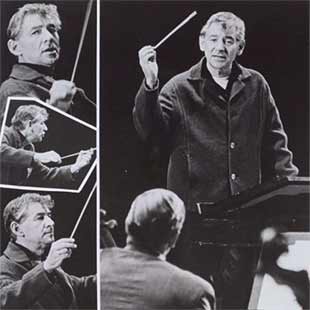DECEMBER 28, 2023 – In watching Maestro (Netflix) I was struck by the central question it raises about the “first internationally acclaimed American-born, American-trained conductor,” the irrepressible Leonard Bernstein: How in the world would you begin to make a film about such a larger-than-life conductor, composer, performer, entertainer, teacher, mentor, world ambassador, humanitarian, political activist, philanthropist, with a personal life that was at once chaotic and tightly knit with family and friends?
As the movie develops the multiplex answer becomes evident: you center the work on “Lenny” and “Felicia,” his wife, with a side lens on other relationships in the life of a bi-sexual guy who “loved people.” Throughout script-writing and filming, you turn another lens on a small fraction of Bernstein’s prodigious music-making and inject a scattering of passing biographical references. With superb acting and directing you strive to capture the idiosyncratic essence of the two principal characters.
Having read several years ago Humphrey Burton’s seminal biography of the maestro (1994 – 544 pages), I found Maestro necessarily superficial; a brilliant cinematic work with high production values but incapable of providing an in-depth examination of über genius in all its complexity. The movie disappoints spectacularly if viewed through the wrong lens.
As “Lenny” explains in an interview scene, conducting and performing are very public endeavors, whereas composing is the opposite—a quintessentially private and personal effort. He, of course, was brilliant in both spheres, but use of filmmaking to depict the inherently inward-peering composing process is bound to fail. Accordingly, Maestro provides only snapshots of Bernstein composing. They are mere reminders, reference points, and though nearly 30 recordings of his works fill the soundtrack, they are limited excerpts skimmed off the surface of his catalogue of compositions. Although the film includes a lengthy scene of Bernstein (channeled brilliantly by Bradley Cooper) conducting the finale of Mahler’s Symphony No. 2 in c minor (the “Resurrection Symphony”), Maestro provides but one brief technical example (Beethoven’s 8th) of how he used his conducting to communicate interpretation.
Wholly omitted from Maestro is any mention of Bernstein’s globe-trotting conducting career; his highly unusual (for his time, certainly) outreach to audiences and young people (his weekly televised Saturday afternoon Young People’s Concerts ran for 14 years, won numerous Emmy Awards and reached millions of young viewers); his 50-year career at Tanglewood (summer home of the BSO (Boston Symphony Orchestra)); dedication of time, effort, and money to philanthropic and humanitarian causes; his outspoken opposition to the Vietnam War and vocal support of the Civil Rights Movement and nuclear disarmament—and his being blacklisted by the FBI.
Making brief, tantalizing appearances in Maestro are Serge Koussevitsky (by way of “dead-ringer” casting), long-time Russian-born conductor of the BSO and Bernstein’s friend and early mentor, and Aaron Copland, Bernstein’s composer-friend-mentor.
One can criticize Maestro, I suppose, for what it didn’t cover, but for what it did capture, and the brilliance with which its limited objective was achieved, the film is well worth a Netflix popcorn session in the comfort of your home. An added bonus is how well it distracts the viewer from the woes of the world.
At a minimum may the film revive appreciation for the depth and breadth of an American titan.
Subscribe to this blog and receive notifications of new posts by email.
© 2023 by Eric Nilsson

2 Comments
Eric, thanks for the review of Maestro. I thought the acting was quite good, as well. I thought the emphasis on Bernstein’s sexuality was unfortunate, and was used to lure in visitors with cheap sensationalism and voyeurism. It ended up overwhelming the brilliance of his musical career, as well as his fascinating life in other regards. But one thing about his sexuality which was omitted, unfortunately, was pointed out in a review in the NY Times. You remember the scene when Koussevitsky tells Lenny and Felicia that they have to be “clean”? That apparently followed an incident after Dimitri Mitropoulos, then the conductor of the Minneapolis Symphony, had sought an appointment succeeding Koussevitsky at the BSO, but lost the opportunity because Bernstein told Koussevitsky that Mitropoulos was gay. If true, the hypocrisy is unforgiveable, in my mind.
Incidentally, and of no importance, Bernstein came to my high school and conducted the NY Philharmonic on three occasions I can recall. It must have been torture for him to come out to the lower middle class ‘burbs of New York, in the amorphous hinterlands of Long Island. I attended all three concerts, and I have to admit I don’t even remember what they performed. It was during the period when West Side Story was being made into a movie, but I know they played true classics. But Bernstein was energetic and dramatic, just as he was portrayed in the movie (maybe not as much as at Ely Cathedral).
WOW, Ginny–on several counts! Fascinating comment. — Eric
Comments are closed.